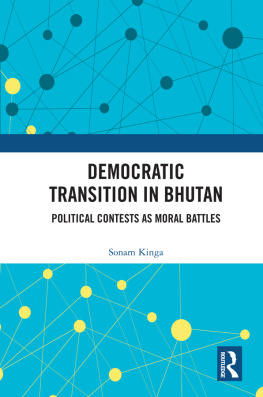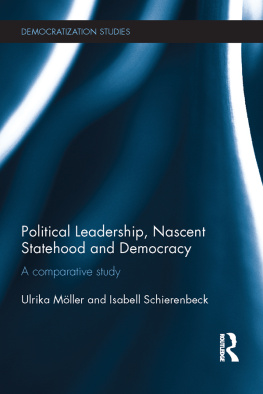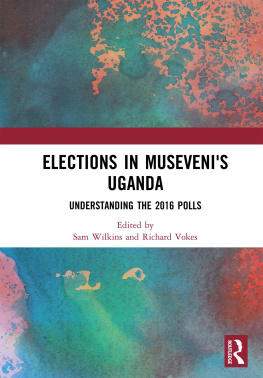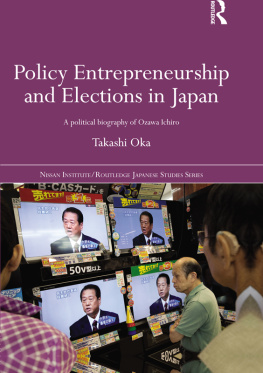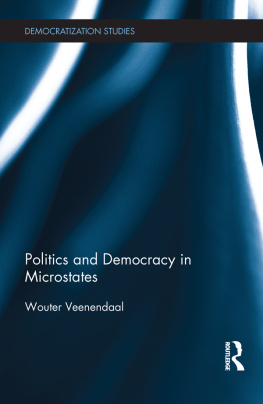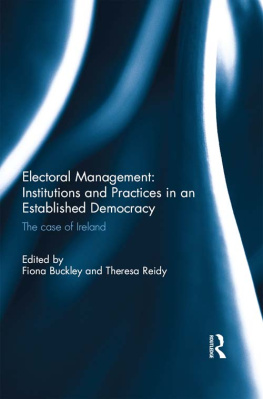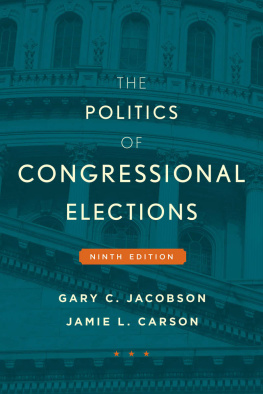Democratic Transition in Bhutan
This book studies how a modern monarchy transformed Bhutan into a parliamentary democracy. A political ethnography, it focuses on the historic elections of 20072008, and studies democracy and its transformational processes from the ground up. It draws on historical as well as contemporary theories about kingship and regime change to analyse Bhutans nascent democratic process and reflect on the direction of political change, both at the state and local levels in the aftermath of the elections. It also presents insights into the electoral and political process by giving a first-hand account of the authors own participation in the elections and ponders on the larger political implications of this election for the region.
A strong theoretical discussion situated in robust fieldwork and personal experience, this book will be an essential read for scholars and researchers of politics, especially comparative politics and political institutions, South Asian and Himalayan Studies, political sociology and social anthropology.
Sonam Kinga teaches at the Royal Institute for Governance and Strategic Studies, Bhutan. He was earlier a Visiting Research Fellow at the Institute of Developing Economies, Tokyo, and later a Visiting Professor at Kyoto University, Japan. He was also a founding member and researcher at The Centre for Bhutan and GNH Studies, Thimphu, Bhutan, and founding editor of the Bhutan Observer. He represented the district of Tashigang for the first two consecutive terms (20082013) in the National Council, Parliament of Bhutan. During his second tenure, he served as the Councils Chairperson. He was awarded the National Order of Merit (Gold) in 2014 and conferred the prestigious honour of Red Scarf and the title Dasho in 2012 by His Majesty the King.
It is a rare book that combines very acute logical and analytic power with intimate insider knowledge on crucial historical moments of democratic transition in Bhutan. This will be uniquely valuable book for those who are interested in Bhutan as well as those interested more generally in monarchy, democracy and politics. It should be read by people who are not even familiar with Bhutan or South Asia, but are willing to think deeply about the state of democracy, as well as those who are interested in politics and governance both at the state and local levels.
Tatsuro Fujikura, Professor of Anthropology, Graduate School of Asian and African Area Studies, Kyoto University, Japan
It is an excellent book! Interesting, informative and well-written! The combination of political theory and ethnographic methodology worked well. And, of course, the whole thing is enriched and enlivened by personal role in the events discussed. I am sure it will have a great impact in Bhutan and far beyond.
Sherry Ortner, Distinguished Professor of Anthropology, University of California, Los Angeles, USA
Democratic Transition in Bhutan
Political Contests as Moral Battles
Sonam Kinga

First published 2020
by Routledge
2 Park Square, Milton Park, Abingdon, Oxon OX14 4RN
and by Routledge
52 Vanderbilt Avenue, New York, NY 10017
Routledge is an imprint of the Taylor & Francis Group, an informa business
2020 Sonam Kinga
The right of Sonam Kinga to be identified as author of this work has been asserted by him in accordance with sections 77 and 78 of the Copyright, Designs and Patents Act 1988.
All rights reserved. No part of this book may be reprinted or reproduced or utilised in any form or by any electronic, mechanical, or other means, now known or hereafter invented, including photocopying and recording, or in any information storage or retrieval system, without permission in writing from the publishers.
Trademark notice: Product or corporate names may be trademarks or registered trademarks, and are used only for identification and explanation without intent to infringe.
British Library Cataloguing-in-Publication Data
A catalogue record for this book is available from the British Library
Library of Congress Cataloging-in-Publication Data
A catalog record for this book has been requested
ISBN: 978-0-367-34834-2 (hbk)
ISBN: 978-0-429-32826-8 (ebk)
Typeset in Sabon
by Apex CoVantage, LLC
Contents
On 9 December 2006, King Jigme Singye Wangchuck, the Fourth King of Bhutan, abdicated to usher in parliamentary democracy. He was only 51 years old and at the height of a very successful reign. His abdication was neither a consequence of external pressure nor of internal unrest but voluntary. The historic transition to democracy took place at his behest, at a time of great peace and prosperity.
He had commanded before his abdication that the Election Commission of Bhutan (ECB) must train voters in the electoral process before the actual elections. On 21 April and 28 May 2007, ECB conducted two rounds of mock elections in order to simulate the primary and general rounds of elections to the National Assembly (hereafter Assembly).
For these mock elections, ECB created four dummy political parties: Druk Blue Party, Druk Green Party, Druk Red Party and Druk Yellow Party. In the primary round, the green and blue parties were eliminated. In the general round, the yellow party won 46 constituencies and the red only one.
Observers claimed that such voting pattern and results would not repeat in actual elections. They argued that the voters did not take the dummy parties and mock elections seriously. However, voters proved them wrong on 24 March 2008 when they gave 45 constituencies to Druk Phuensum Tshogpa (DPT) and only two to the Peoples Democratic Party (PDP). Both the voting pattern and the results had almost repeated.
The mock elections had introduced people to new technologies of voting, electoral processes and new political institutions, particularly the political parties. Until then they had voted to elect representatives to local governments and the erstwhile non-party-based National Assembly. They had generally known their candidates, who had lived among themselves in their communities. On the contrary, voting for abstract dummy political parties and their candidates did not make sense at first. In order to have a reasoned basis for casting votes, they associated the colours of dummy parties with important national institutions. Hence, they voted overwhelmingly for Druk Yellow Party by associating it with monarchy. The yellow scarf is an insignia of Bhutanese kingship.
ECB was concerned that voters would be influenced by such colours in actual parliamentary elections. So, it forbade political parties from using them in their party logos and symbols. Even without such colours, Bhutanese voters, nevertheless, elected to power a political party which they perceived to represent the monarchy. In the mock elections, they perceived PDP as symbolic representation of the King. In actual elections, they saw that in DPT. [T]the people have not changed. Thus the resounding message from the Bhutanese voter: Change? Yes. Complete overhaul? No. (Kinley Dorji, 2008a, p. 1).
In the actual elections, DPT deployed symbols and idioms and invoked historical memories to construct a narrative of monarchical associations and symbols. Besides, it also portrayed the elections as moral contest between good and evil. In projecting itself as the good party, it fell back, among others, on monarchical association and symbols. It stripped the PDP of such associations, which were earlier ascribed to it by its supporters during the days before and after the mock elections. PDP was thrown on the defensive. An image of a rich and evil party painted by its opponent as well as its strategic blunders and scandals, which were widely reported in the press, did not help.

